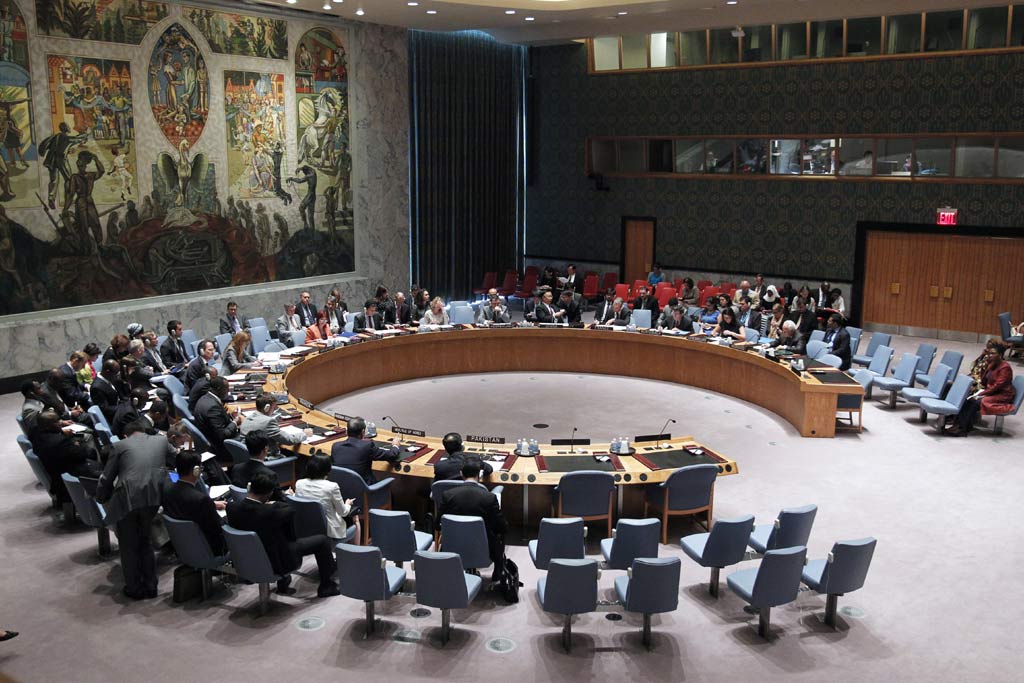
The United Nations Security Council today reiterated that the “swift neutralization” of the Democratic Forces for the Liberation of Rwanda (FDLR) armed group is a top priority in bringing stability to and protecting the civilians of the Democratic Republic of the Congo (DRC) and the Great Lakes region.
The 15-member body noted in a press statement that 2 October marked the half-way point of the six-month timeframe for the voluntary surrender of the FDLR as set out by the joint International Conference of the Great Lakes Region (ICGLR) and Southern African Development Community (SADC) meeting of Ministers of Defence on 2 July.
Since that date “no further voluntary surrenders of members of the FDLR have happened and the FDLR have failed to deliver on their public promise to voluntarily demobilize,” the Council noted with deep concern.
Leaders and members of the FDLR are among the perpetrators of the 1994 genocide against the Tutsi in Rwanda, during which Hutu and others who opposed the genocide were also killed, the Council recalled. Indeed, the FDLR is a group under UN sanctions and which has continued to promote and commit ethnically based and other killings in Rwanda and in the DRC.
Council members reaffirmed support for regional commitments made by the ICGLR and SADC to end the threat of armed groups and undertake a three-month review of the FDLR disarmament process.
It was important to conclude this process swiftly, have a clearly defined end-state and support the process through credible military action by the DRC, with the support of the UN Organization Stabilization Mission in the Democratic Republic of the Congo (MONUSCO).
They stressed that “only substantial progress toward the full demobilization called for by the region and committed to by the FDLR could justify any further reprieve from military action against the FDLR.”
The Council said it would assess the process through the number of surrenders, the number of working weapons handed over, the agreement of those surrendering to be transferred to holding areas determined by the DRC government in coordination with MONUSCO, and the transfer of control over territory to the DRC authorities.
The Council reiterated its call on the Government of the DRC, in coordination with MONUSCO, to undertake military action against those leaders and members of the FDLR who do not engage in the demobilization process or who continue to carry out human rights abuses. There was no need for political dialogue with the FDLR, Members said, reaffirming the need to arrest and bring to justice those responsible war crimes.
FRENCH VERSION
Rappelé que le Conseil de sécurité des Nations Unies aujourd’hui que la “neutralisation rapide” des Forces démocratiques pour la libération du Rwanda (FDLR) groupe armé est une priorité absolue à la stabilité de la protection des civils et de la République démocratique du Congo (RDC) et la région des Grands Lacs.
Le corps de 15 membres a noté dans un communiqué de presse que le 2 Octobre a marqué le point de la période de six mois pour la remise volontaire des FDLR à mi-chemin comme indiqué par l’articulation Conférence internationale de la région des Grands Lacs (CIRGL) et du Sud African Development Community (SADC) réunion des ministres de la Défense le 2 Juillet.
Depuis cette date, “pas d’autres redditions volontaires des membres des FDLR ont passé et les FDLR n’ont pas réussi à tenir leur promesse publique de démobiliser volontairement», le Conseil a noté avec une profonde préoccupation.
Les dirigeants et les membres des FDLR sont parmi les auteurs du génocide de 1994 contre les Tutsis au Rwanda, au cours de laquelle les Hutu et les autres qui se sont opposés au génocide ont également été tués, le Conseil a rappelé. En effet, les FDLR sont un groupe sous sanctions de l’ONU et qui a continué de promouvoir et de commettre des meurtres et d’autres à base ethnique au Rwanda et en RDC.
Les membres du Conseil ont réaffirmé leur soutien à des engagements régionaux pris par la CIRGL et de la SADC de mettre fin à la menace des groupes armés et procéder à un examen de trois mois du processus de désarmement des FDLR.
Il était important de conclure ce processus rapidement, avoir un état final clairement défini et soutenir le processus par une action militaire crédible par la RDC, avec l’appui de la Mission de l’Organisation des Nations Unies pour la stabilisation en République démocratique du Congo (MONUSCO).
Ils ont souligné que «des progrès substantiels en vue que la démobilisation complète demandée par la région et commis par les FDLR pourrait justifier une autre sursis de l’action militaire contre les FDLR.”
Le Conseil a déclaré qu’il évaluerait le processus par le nombre de rachats, le nombre d’armes travail remis, l’accord de ceux s’abandonner à être transférés vers des zones déterminées par le gouvernement de la RDC, en coordination avec la MONUSCO, et le transfert du contrôle sur le territoire aux autorités de la RDC.
Le Conseil a réitéré son appel au gouvernement de la RDC, en coordination avec la MONUSCO, d’entreprendre une action militaire contre les dirigeants et les membres des FDLR qui ne s’engagent pas dans le processus de démobilisation ou qui continuent à effectuer des violations des droits de l’homme. Il n’y avait pas nécessité d’un dialogue politique avec les FDLR, les membres dudit, réaffirmant la nécessité d’arrêter et de traduire en justice les responsables des crimes de guerre


